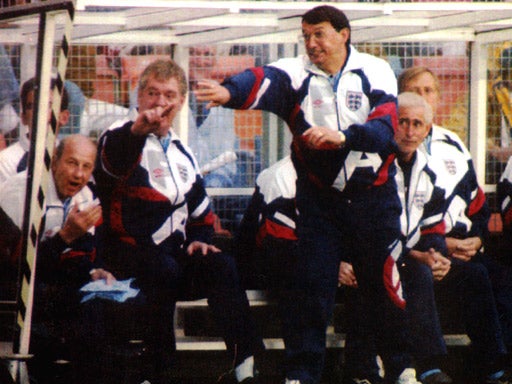Do I not like that! It's Euro '92 all over again
Tough game with France before crashing out against the hosts... there are spooky parallels with Graham Taylor's ill-fated campaign. He talks to Simon Hart

If Roy Hodgson is tempted to bemoan his bad luck with injuries and suspension entering the European Championship, the lesson from one of his predecessors in the England job is that things could have been – indeed, have been – worse.
After all, the England manager will at least fly out to Poland today with a full squad of players – a luxury Graham Taylor did not enjoy 20 years ago when embarking on an ill-fated campaign in Sweden that provides several parallels with this year.
From an English perspective, Euro '92 is remembered largely for The Sun turning Taylor's head into a turnip after England's defeat by Sweden brought an early exit and subsequent vilification for the manager who had substituted Gary Lineker on his final international appearance. Yet, behind that broad-brush stroke, is a chapter of England's history which resonates today. Little wonder that, as Hodgson's options have grown alarmingly thin, Taylor has allowed himself a wry smile. "When I saw the headline 'What more can go wrong?' I thought to myself, 'Do they know what happened to me in terms of injuries?'
"Mark Wright dropped out at the very last minute, so late that we were not allowed to replace him," he explains. "Uefa wouldn't allow it and at that time the squad you could take was 20 – two goalkeepers and 18 outfield players. Because we couldn't replace him we went with 19 players. We also went without a recognised right-back because Gary Stevens, Lee Dixon and Rob Jones were injured. At the very last minute I took Keith Curle, with [two caps], and ended up having to play David Batty at right-back."
Taylor was hamstrung higher up the pitch too. "I'd lost [John] Barnes and [Paul] Gascoigne, who were the two most talented players in the country," he said. Barnes had ruptured his Achilles in the final warm-up match against Finland, eight days before England's opening game. "You've got half your first team out through injury," adds Taylor. "When it comes up with Roy now, I think, 'It has happened before'."
Nor do the similarities end there. England's Group D fixture list of France, Sweden and the co-hosts Ukraine carries echoes of Euro '92, when they took on Michel Platini's France and their Swedish hosts following an opening stalemate with Denmark.
Martin Keown, who played in all three matches, recalls the negative response to that draw with the Danish outsiders, who were only participating because of UN sanctions against Yugoslavia. "There was this huge pressure being created by the media because we did not beat them but, of course, they went on to win the thing," says Keown, who, like Taylor, will be contributing to the BBC's Euro 2012 coverage.
After a second sterile goalless draw with France – featuring Carlton Palmer in a back three – English hopes rose when David Platt scored early in the decisive final game.
It was a different story in the second half, the Swedes striking back through Jan Eriksson and Tomas Brolin, and, looking back, Taylor suggests the signs were there even during the interval: "I remember at half-time going in and saying to the players, 'Have any of you got anything to say at all?' and they looked shattered. The only player who said anything was Nigel Clough, who was a substitute. It really hit me at the time that we do take tired players. Other countries play a lot of football but there's no country in the world that plays its football with the intensity that our Premier League does."
Looking back at the reporting of the campaign, the criticism of Taylor – even Steve Coppell, the columnist for i's sister paper The Independent in Sweden, described England as "the football illiterates of Europe" – is mixed with sympathy. "For England it always seemed likely to end in tears when so many good players withdrew, hors de combat, after another debilitating domestic season," wrote the paper's then football correspondent, Joe Lovejoy – an argument that may well be recycled in about a fortnight's time.
In Taylor's mind, "the turnip situation" – as he puts it – "diminished my authority" for the remainder of his England reign. Hindsight tells him the job came too soon – "I wish it had come at Roy's age" – yet he sees one plus for Hodgson. However bad England's campaign turns out to be, the new manager will not get the blame.
Indeed, as with Denmark's Euro '92 winners – another potential parallel – Taylor suggests the lack of planning time and absence of expectation might prove a blessing. "Nobody expected them to do anything and they played with a refreshing lack of pressure on them. In many respects it is a little similar to England – with this group of players now, if they don't do well, their excuse is already made. It is the [fault of the] FA for making such a late decision; Roy will get a little bit of the criticism but the FA will get most of it. But I have a sneaky little feeling we might do better than a lot of people are thinking."
Subscribe to Independent Premium to bookmark this article
Want to bookmark your favourite articles and stories to read or reference later? Start your Independent Premium subscription today.

Join our commenting forum
Join thought-provoking conversations, follow other Independent readers and see their replies